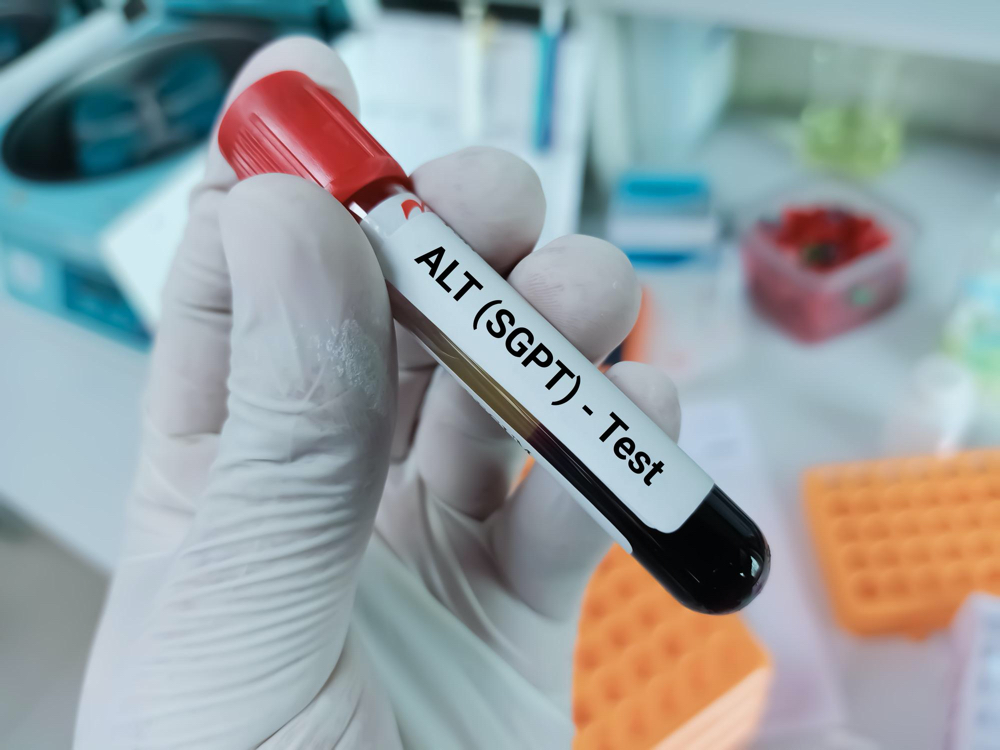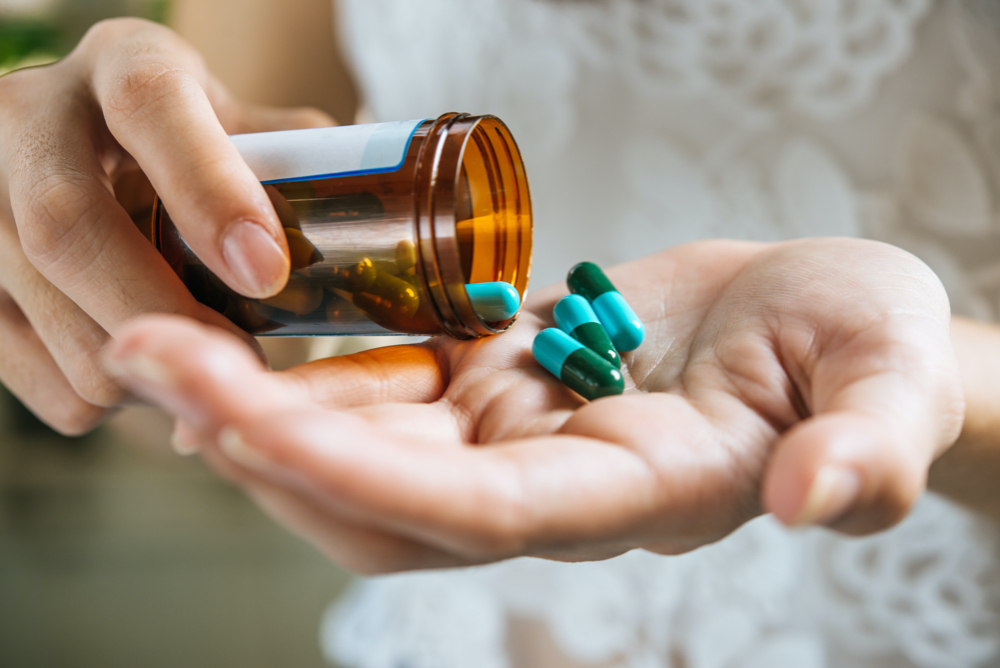- Fast results
- 4,000+ locations
- 4.8 star rating
Need Help? (888) GET LABS

Getting elevated alanine aminotransferase (ALT) or serum glutamic-pyruvic transaminase (SGPT) in your liver function test can be distressing. But what high ALT means depends on factors such as the medications you’re taking, underlying liver disorders, chronic drinking, and consumption of herbal medicine.
Understanding the roles of ALT and its sudden spike in the bloodstream will provide clues on your liver health. Read more about it in the next few lines.

An ALT blood test measures the alanine aminotransferase (ALT) enzyme level to detect liver damage caused by diseases like hepatitis or lifestyle factors such as constant alcohol drinking. The enzyme is an ideal marker for health conditions concerning the liver as it is released to the bloodstream when the liver sustains injuries or undergoes dysfunction.
However, ALT bloodwork does not produce conclusive results on its own. Therefore, it is usually taken as part of the hepatic function panel test and comprehensive metabolic panel, along with other blood tests for other liver enzymes.
In some cases, you might take the ALT blood test first, followed by other labwork to confirm a suspected condition or the other way around. These tests include:

You can measure your ALT levels through blood work here at Personalabs. After you have order your lab tests will have to visit a laboratory for a phlebotomist to collect your blood sample.
Although there is no special preparation before the blood collection for an ALT blood test, you may need to fast if you take it alongside other tests. For example, if it is part of a liver function panel where a bilirubin lab test is involved, you will need to abstain from food and drinks for about 8 hours before the test.
Your ALT level is considered high if it exceeds the normal range of 0 to 44 IU/L. Some laboratories may present a slightly different reference interval, but a test result of 55 IU/L or above could indicate liver problems. If the value exceeds the upper limit of the normal range, it could suggest liver disease or cirrhosis (tissue scarring).
However, other factors could contribute to the increase of ALT in your blood – not just liver disorders. Here are common causes of high ALT:
Patients diagnosed with hepatitis, whether A, B, or C, typically have elevated ALT liver enzymes. Hence, if you got a test value exceeding the normal range of ALT and are showing hepatitis symptoms, consult your doctor to secure the proper diagnostic lab tests.
Aside from hepatitis, studies have also shown that those with infectious mononucleosis have elevated liver enzymes, including ALT. So your doctor may proceed to check for swelling in your tonsils and liver on top of common infection symptoms.
Did you know? Hepatitis can be prevalent among older kids. That’s why it’s vital to detect hepatitis in children at the onset of the symptoms. This allows for better treatment and speedy recovery.

Various drugs can cause high ALT levels, such as anti-seizure medications (phenytoin, valproic acid, carbamazepine, etc.), antidepressants, antipsychotics, cholesterol-lowering drugs, heparin therapy, acetaminophen, and many others. So if you’re taking these medications, make sure to let your doctor know.
Herbal teas and supplements can also elevate your ALT. These include kava, chaparral, ephedra, skull cap, comfrey tea, and Yohimbe. While traditional medicine may suggest that these supplements benefit your health, consult with your healthcare provider before taking them regularly.
Alcohol has been known to cause fatty liver tissues and induce inflammation. As a result, binge drinking elevates liver enzymes like ALT and causes gradual hepatic damage. Other substances like cocaine and poisonous liquid also increase ALT, as they generate high levels of hepatic toxicity.
Medical conditions associated with high ALT include hemochromatosis (iron overload), fatty liver disease, cirrhosis, thyroid disease, diabetes, Celiac disease, cancer, hemolysis, etc. Heart disease has also been associated with elevated ALT.
If you have a family history of liver disease, there’s a higher chance of getting elevated ALT in your bloodwork, especially with an unhealthy lifestyle. So opt for a CMP 14 blood test to be included in your annual wellness checkup to detect liver problems early.

Seeing an elevated ALT in your test results can be alarming, especially if it’s far off the upper limit and if the other parameters also go beyond the normal range. But you can lower this liver enzyme (along with the others) through the following ways:
Finding the root cause of your elevated ALT, whether it’s a disorder or a medication, is imperative for the right course of action in normalizing it. In addition, be mindful of symptoms you may have been experiencing, especially those related to liver problems. These could include abdominal pain and swelling, appetite loss, fatigue, dark urine, pale stool, vomiting, itchy and easily bruised skin, and jaundice (yellow eyes and skin).
Your doctor will assess your symptoms and request appropriate liver function tests. Once the condition is diagnosed, you will be given proper treatment. You will most likely take another ALT test, among others, to see if you already have low ALT levels within the normal range.
Changing your diet typically tops the lifestyle changes that improve your liver health. In the case of high ALT, shifting to a low carbohydrate diet has a beneficial impact on normalizing the liver enzyme’s production.
In a 2015 study, high carbohydrate intake of fructose-rich food and beverages significantly increased ALT. On the other hand, a low-carb diet decreases the enzyme twice as a low-fat diet.
While carbohydrates seem to trigger the spike in liver enzymes, fat, specifically bad cholesterol, doesn’t do any favor. High cholesterol overloads liver function, increases ALT, and even promotes the risk of liver cancer. That said, it’s best to avoid fatty foods such as whole-milk dairy, red meat, and those smothered in oil.
Think you have high cholesterol? You will know for certain when you take the comprehensive lipid profile blood test. Doing so allows you to have a base record of your lipid levels, helping you assess your risk for heart and liver disease.
Coffee comes with plenty of health benefits. However, it can be subjective depending on your physical and mental state. But in the case of liver function, studies have shown that drinking coffee aids in preventing high serum ALT.
Moreover, a 2015 study says that drinking coffee reduces your risk for liver cancer and chronic liver disease, bordering cirrhosis. So secure one cup of coffee daily, especially in lieu of alcohol. If you have anxiety disorders, consult your doctor first, as too much coffee can aggravate the condition.

Exercise promotes liver health and allows you to lose weight. By being physically active for about 30 minutes daily, you improve your metabolism, which involves the oxidation of fatty acids. This helps ease liver function and, by extension, prevents injuries that lead to increased liver enzymes in the blood.
Consistent physical activity is particularly helpful for those with fatty liver. In a 2018 review, evidence shows that regular exercise aid liver functions in people with nonalcoholic fatty liver disease (NAFLD), from damage reduction to improved insulin resistance.
It’s no secret that alcohol can cause severe liver damage if consumed habitually. Heavy drinkers are prone to alcoholic liver disease and alcoholic hepatitis. On top of that, alcohol is also the most significant risk factor for liver cirrhosis.
Smoking is another habit you should shake off if you plan to lower your serum ALT. According to an article published in the Journal of Hepatology, cigarette smoking aggravates liver problems and contributes to the impediment of hepatic treatment. This remains true with secondhand smoke.
If you’re having trouble leaving these unhealthy habits behind, seek help from professionals and support from your social circle.
As herbal teas and vitamin supplements (iron and vitamin A) can cause liver toxicity, make sure to avoid them if you have elevated liver enzymes. Likewise, consult your doctor regarding taking prescribed medications and be sure not to take them beyond the recommended dosage. For example, acetaminophen (a drug for fever and pain) can induce acute liver damage if taken in large amounts.

Liver enzymes AST and ALT are often compared to better understand liver health. Getting high lab values for both AST and ALT indicates the severity of the liver problem. Generally, if AST is significantly elevated than an already high ALT, it could suggest cirrhosis, which can lead to liver failure.
On average, ALT decreases significantly after treatment and lifestyle changes in about four weeks. This depends on how consistent you are with the necessary adjustments. For example, if you have given up alcohol, your ALT could start to drop in a week and continue to do so with continuous abstinence.
Unless you change your diet, start exercising, and eliminate unhealthy habits like heavy drinking and smoking, serum ALT levels will not decrease. Additionally, if the elevation of the liver enzyme is due to a severe liver disorder, failing to address and avail of proper treatment will only contribute to high ALT remaining unchanged.

When your ALT levels are elevated, it’s certainly high time to check your liver. Doing so allows you to seek proper treatment and employ the necessary lifestyle adjustments, such as changing your diet, getting tested for a particular disorder, and being physically active. If symptoms of liver damage are observed, consult your doctor immediately.
Additional Readings

9 Ways To Lower GGT Levels Naturally
Is your GGT high? Learn about these 9 effective ways to lower it naturally.

10 Health Habits You Should Practice To Prevent Cancer
Check out these 10 habits you can adopt to increase your protection against cancer.

© Copyright 2025 Personalabs. All Rights Reserved.